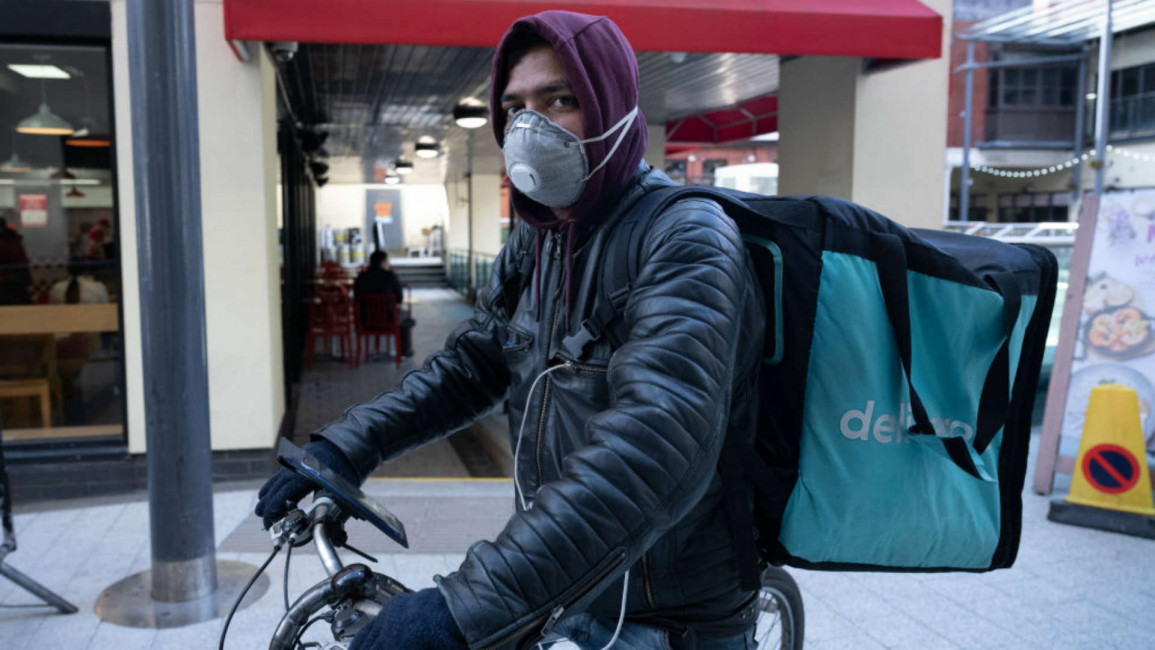
UK coronavirus response forces most vulnerable to shoulder the burden
In the case of the current pandemic, Covid-19 has provided an opportunity for racism in the UK, and across the West for that matter, to intensify, and become further institutionalised.
From the get go, by simply renaming it the "Chinese virus", Trump - the most powerful leader in the world - has given the crisis an ethnicity, and pointed to the fact that yet again, the issue is "the other".
From the US to the UK, people of East-Asian decent are increasingly the target of abuse. Alarm bells started ringing at the end of February with the news that 23-year old Singaporean student, Jonathan Mok, was attacked on Oxford Street in London. His attacker shouted "I don't want your coronavirus in my country."
Prior to the UK government announcing nation-wide self-isolation, friends with children told me stories of other parents hurrying away, or immediately turning their heads when a Chinese parent walked by.
Vietnamese friends voiced fears, and reconsidered leaving the house over worries that they may be a target. Restaurants and other businesses associated with Asian communities have been abandoned and saddled with the stigma of the virus.
What this narrative hides from view, is that while Covid-19 emerged in East Asian wet markets, epidemiologists and academics have linked it to the growing demand for "exotic foods" in the West, and the intensification of industrialised agriculture around the world.
 |
It is the consumption patterns of the wealthiest that have unleashed the current crisis |  |
It is the consumption patterns of the wealthiest that have unleashed the current crisis, just as it has been in the past. Conveniently, East Asians or China have become the targets of blame, in order to avoid accountability and structural change.
Furthermore, the brunt of the crisis is also being borne by the most vulnerable. Communities of colour are some of the poorest in society. Young workers especially, are more likely to be on zero-hour contracts and face harsher working conditions. Many juggle more than one form of precarious employment to try to make ends meet.
Twitter Post
|
This means that most safety nets like statutory sick pay, are a luxury many in working class communities of colour will not have access to. Staying at home, choosing their health and safety is not an option as long as their places of employment continue to function, because despite working endless hours, they are only just surviving on their earnings.
The safety of these workers includes the ability to put bread on their tables. For those whose places of employment have closed, many will be facing dire living conditions as they are deprived of their income. Many will face poverty, and eventually even from their homes.
It is surreal that while the government yet again allows the most vulnerable to continue suffering because of the policies it has championed, such as the underfunding of the NHS, it is also dependent on this section of society. Workers, people of colour and migrants are essential to sustaining the economy, and quite literally to ensuring the survival of the entire British people.
One third of our National Health Service's workforce is made up of people of colour, and many more are being sworn in, or are volunteering to support the coronavirus effort. In fact, Home Secretary Priti Patel, whose political career has been shaped by right-wing anti-migrant policies, announced a visa extension to migrants in the UK, claiming that it is because the UK,
"continues to put the health and wellbeing of people first, and nobody will be punished for circumstances outside of their control. By extending people's visas, we are giving people peace of mind and also ensuring that those in vital services can continue their work."
 |
Most safety nets like statutory sick pay, are a luxury many in working class communities of colour will not have access to |  |
The reality is, Patel and her government are only interested in that latter part - ensuring migrants continue to serve them. Britain's food industry, too, is virtually entirely dependent on migrant labourers, often from Eastern Europe, and the construction industry is similar. Patel - as always - is only focussed on her own narrow agenda.
Following the anti-migrant hostile environment policies, and the toxic xenophobia that was whipped up in the 2019 general election, it is insulting to hear Patel suggest her government is interested in protecting migrants. Just a week before this "grand gesture" by the Home Office, The Independent reported that a lung cancer patient was told to return to the Ukraine despite limits on travel due to the pandemic. Another shining example of the humanitarian sensibilities of the Home Office.
Read more: Coronavirus is killing NHS workers. Their deaths were preventable
The entire affair screams of another scandal, a severe echo of the Windrush debacle. We will use these migrants who will undoubtedly be overworked, underpaid, and suffer poor working conditions for the duration of the crisis, as they endanger their own lives, and even those of their families.
This will last, however, only until the state decides things are stable enough to return to fulfilling racist migration quotas. Just as the British empire brought over thousands of people from the Caribbean to help "rebuild" it following WWII, migrants are once again being expected to provide their labour to save the UK, despite a growing climate of hate whipped up by those at the top.
This strategy also points to a deeper issue in how we have responded to the pandemic. Our perspective and energy continues to be centred on the West. From failing healthcare systems, to workers' rights and the destructive impacts of the virus on the economy, our worries and political vision is limited to Europe and the US.
 |
Staying at home, choosing their health and safety is not an option |  |
Adam Hanieh, a Palestinian academic at SOAS, warns of the limitations of our current approach to the pandemic and its disastrous aftermath. In his sharp analysis for Verso, he writes,
"It is essential to bring international dimensions to the centre of the debate around COVID-19, linking the fight against the virus to questions such as the abolition of 'Third World' debt, an end to IMF/World Bank neoliberal structural adjustment packages, reparations for colonialism, a halt to the global arms trade, an end to sanctions regimes… All of these campaigns are, in effect, global public health issues - they bear directly on the ability of poorer countries to mitigate the effects of the virus and the associated economic downturn."
And indeed, while our government mobilises migrant labour to get itself through the crisis, the Global South is set to pay the price of decades of imposed structural adjustment programmes that have devastated infrastructure, labour markets, and healthcare provision across the world.
To add insult to injury, World Bank officials have already floated the idea of making support for the pandemic-induced crisis conditional on further liberalisation, in effect running their surviving welfare services into the ground.
At home and abroad, it is the poorest, the most vulnerable, the most downtrodden who will shoulder the majority of the burden of the pandemic.
Covid-19 is not a politically neutral issue nor is it affecting us all equally. It is a world transforming event, which is already being dealt with by our rulers through a deepening of existing inequalities.
The years to come will be tough, but we better be prepared to fight to change our current system. Those at the top certainly are. They have already started to make us pay.
Malia Bouattia is an activist, a former president of the National Union of Students, and co-founder of the Students not Suspects/Educators not Informants Network.
Follow her on Twitter: @MaliaBouattia
Opinions expressed in this article remain those of the author and do not necessarily represent those of The New Arab, its editorial board or staff.




